The Example of Emma Hale Smith Can Help

Recently a living prophet, Russell M. Nelson, declared something that has always been true. Joseph Smith taught it.
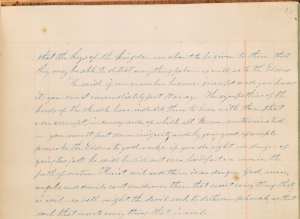
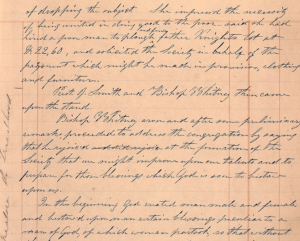
But it hasn’t always been believed by some members of The Church of Jesus Christ of Latter-day Saints.
“The heavens are just as open to women who are endowed with God’s power flowing from their priesthood covenants as they are to men who bear the priesthood,” President Nelson said.
He explained that “accessing the power of God in your life requires the same things that the Lord instructed Emma and each of you to do.”
I do not like it when lesson manuals or teachers try too hard to liken the scriptures to us or prescribe the gospel as if one size fits all. But I like it a lot when prophets declare the truth and invite us to seek and receive revelation to know how to apply the truth to our circumstances. I loved hearing President Nelson invite us to “study prayerfully section 25 of the Doctrine and Covenants and discover what the Holy Ghost will teach you.”
This post is my way of sustaining President Nelson’s invitation. It’s designed to provide backstory to D&C 25 and some orientation to principles of interpreting the scriptures.
Start with them there then
In the technical terms of scriptural hermeneutics or interpretation, start with exegesis (ex-a-gee-sis). In other words, start by working to understand what a revelation meant to its original recipient(s)–to them there then. Don’t assume what it meant. Discover what it meant.
Then, in hermeneutical terms, do eisegesis (ice-a-gee-sis)–determine what the revelation means to you here now. President Nelson taught this way when he invited us to “study prayerfully section 25 of the Doctrine and Covenants and discover what the Holy Ghost will teach you.”
I hope this post helps someone discern how to act here and now on what the Lord told Emma there and then. There was Harmony, Pennsylvania, a settlement on the Susequhanna River where Emma was born in the summer of 1804. Then was twenty-six years later, July 1830, when the Lord gave the revelation.
In order to come as close as possible to understanding the revelation as Emma did, try to pretend that then is now and you are her.
Three years ago you married Joseph against your parents’ wishes
Then you watched Joseph translate the Book of Mormon. In the midst of that you gave birth to a son who lived less than an hour, and you barely survived weeks of infection. Then, just three months ago, Joseph restored the Savior’s church.
Your parents raised you with middle class aspirations. They worried that by marrying Joseph you were opting for poverty and infamy. Their worries were well founded. Right after your marriage you moved in with Joseph’s parents, then about a year later you moved in with yours. They offered you and Joseph a small farm and a smaller home, allowing payment over time. Only the generous help of friends enabled you and Joseph to make the payments. You have had to depend on others financially. You worry about that.
One month ago, you were baptized near Colesville, New York as a group of angry neighbors objected. Before you could be confirmed, the raging crowd drove you and other saints into the Knight family’s home for refuge. Then a constable arrested Joseph for preaching the Book of Mormon. For the next few days you waited at your sister’s home, praying and “awaiting with much anxiety the issue of those ungodly proceedings.” You felt your “very heart strings would be broken with grief” as Joseph is tried and acquitted in two counties, spat on, insulted, and mocked.
Finally you and Joseph arrive safely at home. There the Lord gives a revelation that makes you more worried. Married life thus far had been tumultuous, and you’re understandably concerned about your family’s financial future and safety. Then the Lord tells your husband:
“Thou shalt devote all they service in Zion; and in this thou shalt have strength. Be patient in afflictions, for thou shalt have many; but endure them, for, lo, I am with thee, even unto the end of thy days. And in temporal labors thou shalt not have strength, for this is not they calling. Attend to thy calling and thou shalt have wherewith to magnify thine office” (D&C 24:7-9).
So there you go. The Lord essentially guaranteed you and Joseph a modest living that depended on the faithfulness of the saints. If the saints will support you, there will be enough to enable Joseph to devote his life to the saints. Other young wives in your time and place are aspiring to secure financial futures, but all the revelation foreshadows for you is a life of hardship with a husband who belongs to the church. You know him well enough to have no doubt that he will devote himself to Zion. Will you have faith enough to face that future? The Lord thinks so. He knows you well. He gives the next revelation directly to you. It comes through Joseph but the Lord speaks to you and shows that he knows your hopes and dreams, fears and frustrations.
It has a more affectionate tone than most, but it is straightforward
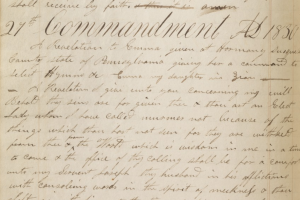
The first promise the Lord makes to Emma is that he will preserve her life. It’s a conditional promise based on whether she chooses to be faithful and virtuous. It was no hollow promise. She had barely survived childbirth. She knew women who hadn’t survived. And soon she would be expecting twins, increasingly the possibility of complications and death. Though it might not even register with readers now, the Lord’s promise of life would have been precious to Emma. So would His promise that she would “receive an inheritance in Zion.” It would have meant the world to her, since forsaking the world was the price she was willing to pay for that promise. Like all early saints, Emma was counter cultural in that respect.
“Murmur not,” the Lord commands Emma, “because of the things which thou hast not seen.” It’s commonly assumed that this clause refers to the Book of Mormon plates, but there is no reason to rule out other possibilities. Emma may have seen the plates. When she was asked if she saw them or not she didn’t answer directly. She testified that she handled them through a cloth. She didn’t say she never saw them. Besides, there were other things she may have longed to see but didn’t: visions, angels, marvelous translation.
Emma was among the first to receive a calling in the restored Church of Jesus Christ
Part of her calling, the Lord said, was to support Joseph in his: comfort him, go with him, and scribe for him. But Emma’s calling also included being ordained to preach–to expound scripture and to exhort the saints by the power of the Holy Ghost. There was a lot for Emma to be afraid of in that list of assignments.
First, it sounded like Joseph would be like the rope in a tug-o-war between the Lord and Emma: “The office of thy calling shall be for a comfort unto my servant, Joseph Smith, Jun., thy husband . . . ” The Lord was asking her to share Joseph with Him and the saints, and to make Joseph better at serving them by strengthening him. Emma could comfort and console Joseph so he could renewed for the burdens the Lord and the saints would place on him.
And “go with him at the time of his going,” the Lord told Emma. That’s another line that is easy to miss when we read. To her, however, it may have been the revelation’s most demanding clause. Expecting twins, she boarded a sleigh near her parents’ home that winter and headed west with Joseph. She went with Joseph in every sense–to comfort and console, to expound and exhort, to compile hymns, to inherit Zion–and that meant that she never saw her parents again.
The Lord follows Emma’s heavy list of callings by telling her how He’ll make her equal to them: He promises to give her the Holy Ghost, knowledge, and enough financial support. Barely. She’ll have to “lay aside the things of this world, and seek for the things of a better” to do what she’s been called to do and become what she’s been ordained to be, and to inherit Zion. Emma could see where it all led. She would have to starve her telestial aspirations and feed her celestial ones.
This revelation helps us see Emma’s conflicted complexity as the Lord did. Since she was human like us, there was a constant civil war inside her. The Lord saw that she was meek but could be proud. She wanted to complain about what she hadn’t seen at the same time she trusted incredibly in her husband’s revelations. She coveted the things of this world but longed for the things of a better world. She was afraid of the unknown and willing to go and do what the Lord commanded her.
My favorite thing about Emma’s revelation is how capable the Lord reveals she is
She’s full of potential. His high expectations are frightening to her. Can she possibly exercise that much faith? Chart a course that’s so counter to her culture? Expound? Exhort? Select sacred hymns? Comfort? Console? Shun pride? Maintain meekness? Delight in the glory her husband receives? Keep God’s commands continually? Cleave to her covenants?
She wanted to. She wondered and worried whether she could. She let the revelation orient her life. She selected sacred hymns for the saints. She expounded scripture by the Holy Ghost. The Nauvoo Relief Society Minute Book is full of her exhortations.
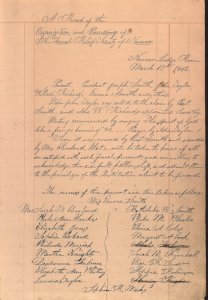
She comforted. She consoled. In 1842, when Joseph was evading arrest for unjust charges, Emma may have remembered when the constable came for him twelve years earlier. She had been consoling him ever since. She wasn’t about to stop now. She went to Joseph in his hiding place. “Again she is here,” he said about that visit and all the earlier consoling times, “even in the seventh trouble—undaunted, firm, and unwavering—unchangeable, affectionate Emma!”
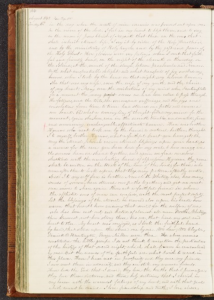
In September 1843 Joseph sealed on Emma’s head the “crown of righteousness” the Lord promised in Section 25
Then, just days before his death in 1844, Joseph invited Emma to write her own blessing. She thought of Section 25 and penned her hopes that she would be able to obey its commands and receive its promised blessings. (Carol Madsen told that story best)
Emma clung to her covenants through Abrahamic tests. She could have, and perhaps sometimes did, consider herself in competition with the Lord and the saints for Joseph’s time and attention. The Lord assured her, however, that she was His highly favored daughter. He expected more of her than she may have thought she could give. I believe He will be true to His promise to give her all she ultimately wanted.
PS
That last sentence is not just wishful thinking. It’s based on the revealed terms and conditions of the new and everlasting covenant of marriage and knowing whether or not Emma made that covenant and abided by its terms. Subscribe if you want to be notified when I post the story of what I know about that and how.

 Whiskey, whiskey, whiskey
Whiskey, whiskey, whiskey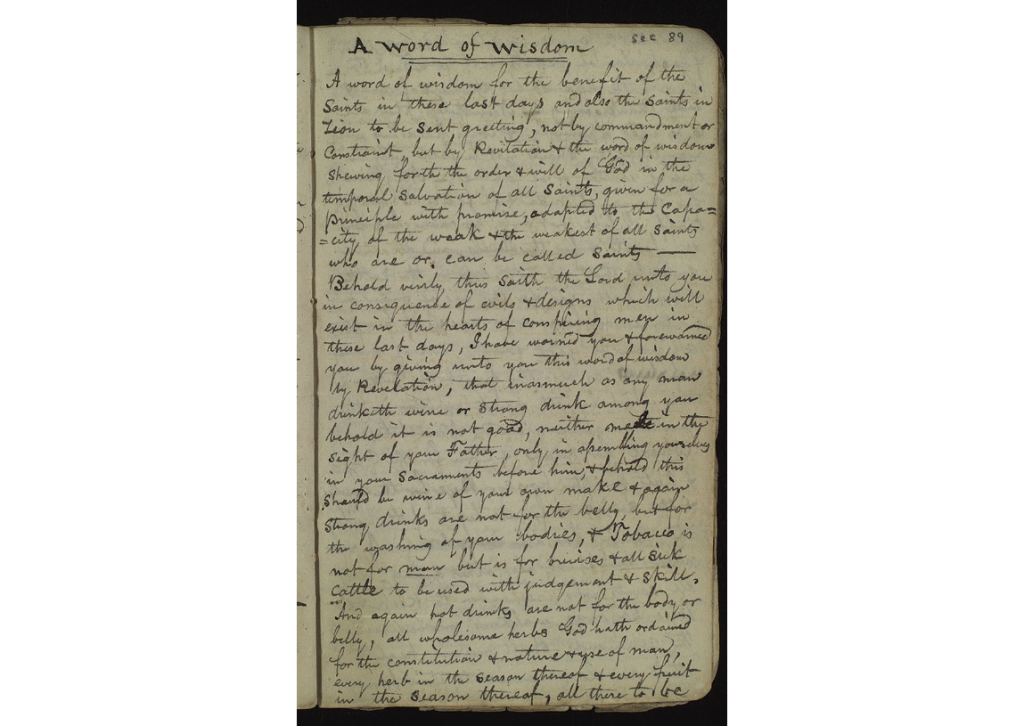
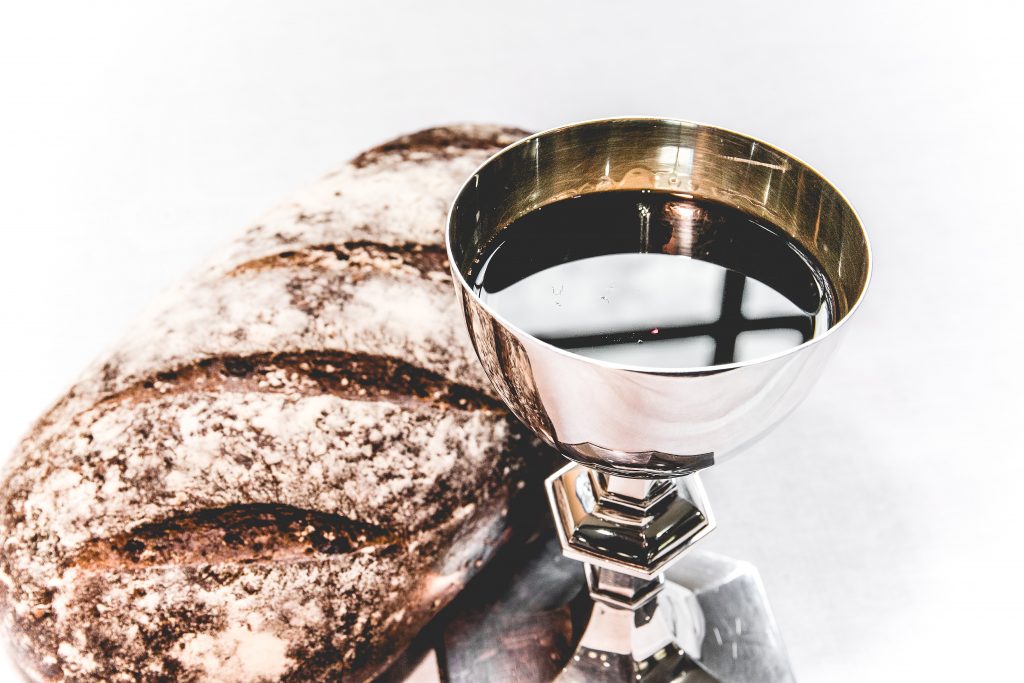
 Joseph might find it odd but not unexpected that critics devour the evidence he left us that once in a while he had a beer or drank a glass of homemade wine or enjoyed sacramental wine, or that he was tempted by whiskey, or that he drank some while he was unjustly imprisoned in a depressing dungeon. He might be puzzled that some people have focused inordinate attention on prosecuting him while overlooking the prophetic Word of Wisdom he produced. “I never told you I was perfect,” Joseph said, “but there is no error in the revelations which I have taught.” It is not hard to find faults Joseph did not try to hide, but where are the flaws in his revelation known as the Word of Wisdom?
Joseph might find it odd but not unexpected that critics devour the evidence he left us that once in a while he had a beer or drank a glass of homemade wine or enjoyed sacramental wine, or that he was tempted by whiskey, or that he drank some while he was unjustly imprisoned in a depressing dungeon. He might be puzzled that some people have focused inordinate attention on prosecuting him while overlooking the prophetic Word of Wisdom he produced. “I never told you I was perfect,” Joseph said, “but there is no error in the revelations which I have taught.” It is not hard to find faults Joseph did not try to hide, but where are the flaws in his revelation known as the Word of Wisdom?